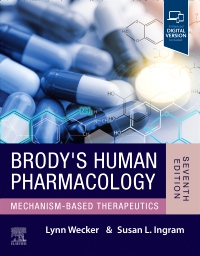
Brody's Human Pharmacology, 7th Edition
Paperback

What can be a very difficult and complex topic is divided into easily digestible chapters, each of which is clearly structured from a therapeutic overview to mechanisms of action, relationships to clinical responses, pharmacokinetics, pharmacovigilance, new developments, and clinical relevance for all health professionals.
-
- Contains all the essential aspects of pharmacology – suitable for exam preparation
- Full color illustrations explain important processes and color-coded boxes enhance understanding
- Therapeutic overviews, clinical problems and trade names – everything you need to know
- Self-assessment questions and further reading to reinforce learning
- Current developments for each class of drugs and how information relates to students in the healthcare professions bring learning to life
-
SECTION 1 Mechanisms of Drug Action and Therapeutic Principles
1. Introduction
2. Cellular Receptors and Drug Concentration-Response Relationships
3. Pharmacokinetics
4. Pharmacogenetics
5. Drug Discovery, Development, and Regulation
SECTION 2 Chemical Mediators and Drugs Affecting Autonomic and Neuromuscular Synapses
6. Introduction to the Autonomic Nervous System
Cholinergic Drugs
7. Muscarinic Agonists, Cholinesterase Inhibitors, and Their Clinical Uses
8. Muscarinic Antagonists and Their Clinical Uses
9. Nicotinic Agonists and Their Clinical Uses
10. Neuromuscular Blocking Drugs and Nicotinic Antagonists
Adrenergic Drugs
11. Adrenergic Agonists and Their Clinical Uses
12. Adrenergic Antagonists and Their Clinical Uses
SECTION 3 Drug Treatment for Disorders Affecting the Central Nervous System
13. The Central Nervous System
14. Drug Therapy for Alzheimer Disease and Other Cognitive Disorders/Dementias
15. Pharmacotherapy of Basal Ganglia Disorders: Parkinson Disease and Huntington Disease
16. Drug Therapy for Psychoses and Bipolar Disorder
17. Drug Therapy for Depression and Anxiety
18. Drug Therapy for the Management of Attention Deficit-Hyperactivity Disorder
19. Drug Therapy for Insomnia and the Hypersomnias
20. Drug Therapy for Managing Obesity and Eating Disorders
21. Treatment of Seizure Disorders
22. Drug Therapy for Spasticity Disorders
23. Ethanol, Other Alcohols, and Medications for Alcohol Use Disorder
24. Psychoactive Compounds and Substance Use Disorder
SECTION 4 Drug Therapy for Pain Management
25. Introduction
26. General Anesthetics
27. Local Anesthetics
28. Opioid Analgesics
29. Nonsteroidal Antiinflammatory Drugs and Acetaminophen
30. Cannabinoids
31. Drug Therapy for Migraine Headache
SECTION 5 Treatment of Inflammatory, Allergic and Immunologic Disorders
32. Drug Therapy for Gout and Hyperuricemia
33. Pharmacological Interventions for Allergic Reactions
34. Immunosuppressants for Autoimmune Disorders and Organ Transplantation
35. Drug Therapy for Rheumatoid Arthritis
SECTION 6 Drug Treatment for Cardiovascular Diseases
36. Introduction to the Regulation of Cardiovascular Function
37. Overview of Hypertension Management and Drugs That Decrease Sympathetic Tone
38. Diuretics and Drugs That Affect Volume and Electrolyte Content
39. Drugs Affecting the Renin-Angiotensin-Aldosterone System
40. Calcium-Channel Blockers
41. Vasodilators for Hypertensive Crises, Pulmonary Hypertension, and Erectile Dysfunction
42. Treatment of Hyperlipidemias and Atherosclerotic Cardiovascular Disease
43. Treatment of Myocardial Ischemia and Angina Pectoris
44. Treatment of Heart Failure
45. Antiarrhythmic Drugs
46. Anticoagulant, Antiplatelet, and Fibrinolytic Medications
47. Drug Therapy for Hemophilia and the Deficiency Anemias
SECTION 7 Treatment of Endocrine Disorders
48. Introduction to Endocrine Pharmacology
49. Treatment of Hypothalamic and Pituitary Disorders
50. Diagnosis and Treatment of Adrenocorticosteroid Disorders
51. Female Hormone Regulation
52. Androgens, Antiandrogens, and Their Clinical Uses
53. Drug Therapy for the Management of Diabetes
54. Drug Therapy for the Management of Thyroid Disorders
55. Calcium Regulating Hormones and Other Agents Affecting Bone
SECTION 8 Chemotherapy
Infectious Diseases
56. Principles of Antimicrobial Use
57. Drugs Targeting Bacterial Cell Walls and Membranes
58. Drugs Targeting Bacterial Protein Synthesis
59. Drugs Targeting Bacterial DNA
60. Antimycobacterial Agents
61. Drugs Targeting Resistant Organisms
Parasitic Diseases
62. Antifungal Agents
63. Antimalarial and Other Antiprotozoal Agents
64. Anthelmintics and Ectoparasiticides
Viruses
65. Antiviral Agents
66. Antiretroviral Drugs for HIV
Cancer
67. Principles of Cancer and Antineoplastic Drug Use
68. Cytotoxic Agents
69. Targeted Anticancer Agents
70. Immunological and Cell-Based Therapies
SECTION 9 Special Considerations
71. Therapeutic Use of Hematopoietic Growth Factors
72. Gastrointestinal Disorders and Their Treatment
73. Pharmacological Interventions for Asthma and Chronic Obstructive Pulmonary Disorders
74. Dietary Supplements, Nutraceuticals, and Natural Products
75. Essentials of Toxicology
76. Therapeutic Considerations for Pregnant, Pediatric, Geriatric, and Obese Individuals
Hypersomnias


 as described in our
as described in our 